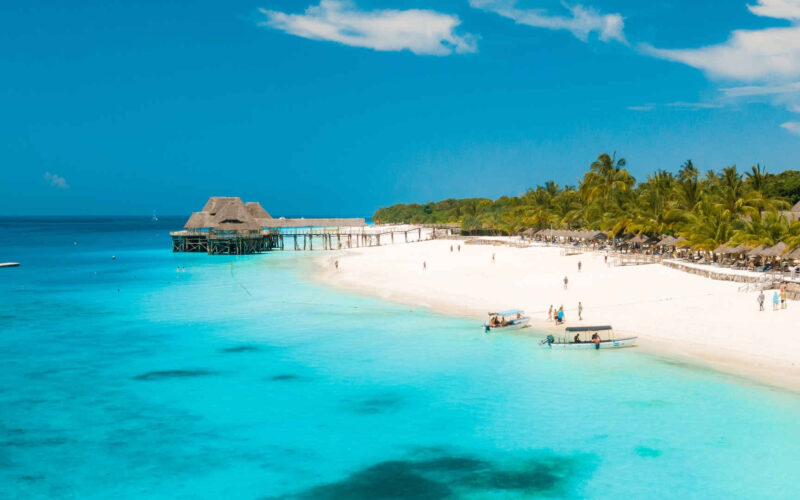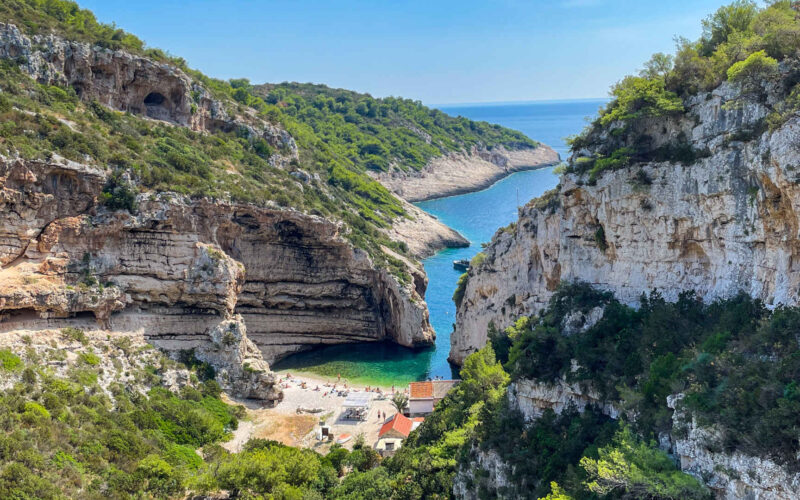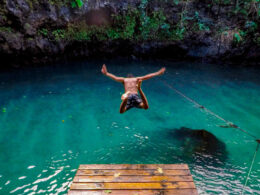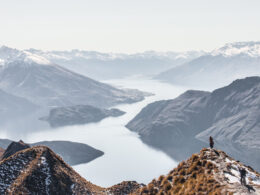Located in the heart of the South Pacific, Fiji comprises an archipelago of more than 330 islands, of which 110 are inhabited. From the mesmerizing coral reefs of Mamanuca and Yasawa islands, the lush rainforests of Taveuni, to the charismatic capital city of Suva and the tourist hotspot Nadi, there’s an island or city to fit every digital nomad’s lifestyle and preference.
Known for its exceptional connectivity and welcoming visa policies, Fiji offers an expanding landscape of coworking spaces. These creative hubs in Suva and Nadi are designed to foster innovation and productivity, offering comfortable workstations, meeting rooms, and all the essential amenities you need to stay on top of your work.
In your downtime, immerse yourself in the rich Fijian culture, explore the abundant marine life, dive into the culinary delights, or engage in the myriad adventure activities the islands offer. Fiji’s cost of living is also an appealing factor, especially when you consider the unparalleled natural beauty and tranquility you get in return.
A significant part of the Fijian charm lies in its people. Renowned for their hospitality, Fijians welcome digital nomads with open arms, making you feel at home in this tropical haven. Moreover, with English being one of the official languages, you won’t face any language barriers while interacting with locals or conducting your business.
Fiji’s slow-paced island lifestyle and vibrant local culture offer a delightful contrast to the fast-paced, high-tech world of digital work, providing the perfect backdrop for a digital nomad life that blends productivity with leisure, culture, and adventure.
I. The Basics
Cost of Living
Here’s a snapshot of the monthly cost of living for a digital nomad in Fiji. Note that these costs can vary depending on your lifestyle:
- Accommodation: Depending on location, a one-bedroom apartment in the city center might cost between FJD 1,000-1,800 ($475-$850 USD), while outside the city center it may range from FJD 700-1,200 ($330-$570 USD).
- Food: Eating out at inexpensive restaurants might cost around FJD 15-20 per meal ($7-$10 USD). Groceries for a single person may average around FJD 300-400 per month ($140-$190 USD).
- Transportation: A monthly pass for local transport can be around FJD 100-150 ($47-$70 USD). Taxis and fuel costs can vary depending on usage.
- Utilities: Basic utilities including electricity, heating, cooling, water, and garbage for an apartment might cost between FJD 200-300 per month ($95-$140 USD). Internet can add another FJD 80-120 per month ($38-$57 USD).
Connectivity and Infrastructure
Suva and Nadi, Fiji’s urban heartbeats, host a stable digital infrastructure with high-speed internet services, courtesy of top-tier telecom providers like Vodafone and Digicel. Their comprehensive 4G services extend beyond the city limits, ensuring connectivity even amidst Fiji’s picturesque landscapes. Public Wi-Fi is commonplace and reliable, featured in many cafes, hotels, and restaurants, which also serve as ideal makeshift workspaces. The power and water supplies are consistently dependable, more so in urban areas and key tourist spots. Public transport, including buses, taxis, and a network of ferries, facilitates easy and economical movement across the islands.
Healthcare
The Fijian healthcare landscape encompasses both public and private sectors. Public healthcare, although accessible and affordable, can have limited facilities, particularly in rural sectors. In contrast, private healthcare institutions in urban locales like Suva and Nadi offer superior standards of care. However, they come with a heftier price tag. Digital nomads are advised to have a comprehensive health insurance policy in place. Ideally, it should cover not only routine healthcare but also potential emergency medical evacuations to advanced medical facilities in Australia or New Zealand.
Safety
Fiji has a reputation as a safe destination for digital nomads. Crime rates are generally low, but standard safety measures are encouraged. These include safeguarding personal belongings and steering clear of secluded areas during nighttime. Given Fiji’s geographic positioning, it’s subject to natural phenomena like cyclones. Therefore, staying informed about local weather forecasts is crucial. Notwithstanding these challenges, the Fijian populace is renowned for its warm hospitality, adding an extra layer of comfort and security for digital nomads calling Fiji their temporary home.
II. Living in Fiji as a Digital Nomad
Climate
Fiji’s tropical climate is one of its key attractions, offering warm temperatures and abundant sunshine throughout the year. The country has two distinct seasons: the dry season from May to October, with temperatures averaging between 20-26°C (68-79°F), and the wet season from November to April, marked by higher humidity, occasional tropical rainstorms, and temperatures ranging between 22-33°C (72-91°F). Cyclones are possible during the wet season, so digital nomads should stay updated on weather conditions.
Nature
The natural beauty of Fiji, an archipelago of over 300 islands, each possessing its unique charm, offers a vibrant palette of experiences for nature enthusiasts. This South Pacific paradise boasts a variety of landscapes that can transport you from pristine sandy beaches to rich, unspoiled rainforests, all within the span of a day.
Beaches, arguably the first picture that springs to mind when thinking about Fiji, are breathtakingly beautiful. You’ll encounter tranquil lagoons with turquoise waters, stretches of soft white sand framed by palm trees, and secluded coves. These shores serve as gateways to an underwater world teeming with diverse marine life, making snorkeling and scuba diving popular pastimes for locals and visitors alike.
Fiji’s coral reefs are a significant draw for divers, presenting a kaleidoscope of colors and a variety of unique species. The Great Astrolabe Reef, for instance, is the world’s fourth-largest barrier reef and offers unrivaled diving experiences. Here, you can find everything from delicate soft corals and sponges to imposing manta rays and reef sharks.
Beyond the beaches, the interiors of the islands unveil a different side of Fiji’s natural charm. Verdant rainforests, some largely untouched by human activity, present a lush world of tropical flora and fauna. These forests echo with the calls of exotic bird species, including the rare silktail and the colourful fruit doves, making bird watching a captivating activity.
Not to be overshadowed by the rich lowlands, Fiji’s highlands offer another facet of the country’s natural bounty. Soaring mountains and ridges provide challenging treks with rewarding panoramic views at the summit. You’ll also discover serene waterfalls scattered across the islands, where the surrounding tranquility makes them perfect spots for relaxation and reflection.
In short, Fiji’s natural environment offers a delightful balance between vibrant biodiversity and serene landscapes, presenting digital nomads with a refreshing change of scene and an endless array of exploratory opportunities.
Lifestyle
Living in Fiji blends relaxed island living with an invigorating, culturally rich lifestyle. Fijian people are renowned for their friendliness and hospitality, and community and family ties are central to their way of life. Festivals and celebrations are frequent, many of which welcome visitor participation, offering a chance to immerse in local culture.
Fijian cuisine is a delightful amalgamation of fresh, local ingredients and influences from India, China, and the Pacific. Staples include seafood, taro, coconut, and sweet potatoes. Don’t miss the traditional lovo feast, where food is cooked in an earth oven.
Nightlife in Fiji varies. In Suva and Nadi, you’ll find a range of options from quiet bars and pubs to vibrant clubs and live music venues. In contrast, the smaller islands offer a more low-key nightlife, often centered around beachfront bonfires, traditional Fijian music, and storytelling.
Culture
Fijian culture is a tapestry woven with the threads of a diverse historical lineage. Indigenous traditions mingle with influences from India, China, and Europe, creating a cultural richness that’s palpable in every aspect of Fijian life.
Traditional ceremonies like the kava ceremony, where a drink made from the kava plant is shared, offer fascinating insights into indigenous customs. The Meke, a form of storytelling through song and dance, is another cornerstone of Fijian culture that’s often performed at communal gatherings and celebrations.
Historically, Fiji was a hub for Pacific trade, with its strategic location attracting European explorers, missionaries, and traders. This history is beautifully preserved in sites like the Fiji Museum in Suva, which houses artifacts dating back 3,700 years.
Local attractions are plentiful. Aside from the beautiful natural landscapes, you can explore Levuka, Fiji’s first capital and a UNESCO World Heritage Site. The Sri Siva Subramaniya Temple in Nadi, a vibrant Hindu temple, highlights the Indo-Fijian culture. Don’t miss the Mamanuca and Yasawa island groups, famous for their stunning beaches and crystal-clear waters.
Language
English, Fijian, and Hindi are the three official languages of Fiji, with English widely spoken and understood. This makes communication relatively straightforward for most digital nomads.
Fijian people are renowned for their friendliness and hospitality, so you’ll likely find locals more than willing to help should you have questions or need assistance. Moreover, Fijians have a deep respect for communal living and a shared sense of responsibility, which contributes to the overall welcoming atmosphere for foreigners.
While it isn’t necessary to learn Fijian or Hindi to live comfortably in Fiji, picking up a few basic phrases can be a delightful way to engage more deeply with local culture.
III. Cities to Consider
Suva

As Fiji’s capital and largest city, Suva is a vibrant, cosmopolitan hub and a great base for digital nomads. It offers a mix of modern amenities, a bustling market scene, cultural sites, and an active nightlife. As the political and administrative heart of Fiji, it’s also home to numerous embassies and international organizations. The city boasts a variety of accommodation options to suit different budgets, from shared housing to luxury apartments. Suva is also home to the University of the South Pacific, adding a youthful energy to the city.
Nadi

Nadi, located on the west coast of the main island, Viti Levu, is the gateway to Fiji for most international visitors, as it hosts the country’s main international airport. The city offers a variety of conveniences, including supermarkets, restaurants, and the largest Hindu temple in the Southern hemisphere, Sri Siva Subramaniya temple. The nearby Denarau Island houses upscale resorts, a golf course, and a marina – a starting point for many cruises to the Mamanuca and Yasawa Islands.
Lautoka

Known as the “Sugar City” due to its surrounding sugar cane farms, Lautoka is Fiji’s second-largest city. It offers a slower pace of life compared to Suva or Nadi, but still provides all necessary amenities. The city has a rich history and is known for its lively festivals, beautiful parks, and the local market that offers a range of fresh produce. It’s also located near stunning natural sites like Koroyanitu National Heritage Park, perfect for those who enjoy outdoor adventures.
Savusavu

Located on Vanua Levu, Fiji’s second-largest island, Savusavu is a hidden gem for digital nomads. Known as the “Hidden Paradise of Fiji,” this town is famous for its hot springs, pearl farms, and beautiful bay, a popular yachting spot. Although smaller and more remote than cities on Viti Levu, Savusavu has a strong expat community and a relaxed, welcoming atmosphere. For digital nomads seeking a slower pace of life, closer to nature but still with decent amenities and connectivity, Savusavu could be the ideal choice.
IV. Off the Beaten Track
Taveuni

Known as the “Garden Island”, Taveuni is Fiji’s third-largest island and an off-the-beaten-path paradise for nature enthusiasts. About 80% of the island is protected within the Bouma National Heritage Park, providing ample opportunities for hiking, bird-watching, and exploring waterfalls and natural water slides. The island’s eastern shore also boasts excellent dive sites, including the world-famous Rainbow Reef.
Kadavu

Kadavu is the fourth largest island in Fiji and is a destination that has remained largely untouched by mass tourism. The island’s rugged coastline is home to the Great Astrolabe Reef, offering incredible opportunities for diving and snorkeling. Traditional Fijian culture thrives here; most villages engage in traditional fishing practices, and there are no real towns or roads.
Levuka

Levuka, on Ovalau Island, was Fiji’s first colonial capital and has been recognized as a UNESCO World Heritage Site. Walking through the town is like stepping back in time with well-preserved colonial architecture, quiet streets, and a tranquil seaside setting. Although not as secluded as Kadavu or Taveuni, Levuka’s rich history and cultural significance make it an intriguing off-the-beaten-path option.
Yasawa Islands

The Yasawa Islands offer a more remote and unspoiled version of Fiji. The island group is home to traditional villages where visitors can experience Fijian culture firsthand. With crystal clear lagoons, stunning beaches, and spectacular hiking trails, the Yasawas are an idyllic off-the-beaten-path destination for digital nomads seeking peace, quiet, and natural beauty.
All these destinations offer slower, quieter, and more traditional experiences for digital nomads seeking to immerse themselves in Fijian culture and nature while maintaining enough connectivity to work effectively.
V. Visas
Fiji does not currently offer a specific digital nomad visa. However, Fiji provides other visa options that may be suitable for those looking to stay and work remotely, such as the tourist visa and business visa.
1. Visitor Visa
Most nationalities can enter Fiji without a prearranged visa and stay as tourists for up to four months. This includes citizens from the United States, Canada, UK, Australia, New Zealand, and all EU countries. This visa does not allow you to work for a Fijian employer, but you can continue working remotely for an overseas employer.
Process:
- Tourist visas can be applied for online before arrival or obtained on arrival for nationals of certain countries.
- Applicants need to fill out an application form, submit the required documents, and pay the visa fee.
Documentation:
- Valid passport with at least six months of validity from the planned date of entry.
- Return or onward travel tickets and proof of sufficient funds to cover the stay.
- Confirmed accommodation booking or invitation letter if staying with friends or relatives.
2. Business Visa
Designed for individuals who intend to engage in business activities in Fiji that do not amount to employment, such as attending conferences or exploring business opportunities.
Process:
- Like the tourist visa, the business visa application can be completed online, or visas can be issued on arrival depending on the applicant’s nationality.
- Specific details regarding the business activities might need to be provided.
Documentation:
- Valid passport and a photo.
- Details of the Fijian company or business contacts.
- Invitation letter from the host company in Fiji detailing the purpose and duration of the visit.
- Proof of financial means and accommodation.
Remember, visa regulations can change, and the requirements can vary depending on your nationality. Always check the latest guidelines from the Fiji Immigration Department before planning your stay.
VI. Tips for a Smooth Landing
Accommodation
Fiji offers a range of accommodation options for digital nomads. From city apartments in Suva and Nadi to beachfront bungalows on the smaller islands, there’s something for every taste and budget. Online platforms like Airbnb, Booking.com, and local real estate websites can be used for initial research and booking. If you’re planning a longer stay, consider staying in a guesthouse or hotel initially, then look for a rental once you’re on the ground and familiar with the area.
Finances
As a foreigner, you can open a bank account in Fiji. The primary banks are ANZ, Westpac, Bank of South Pacific (BSP), and Bank of Baroda. To open an account, you’ll generally need your passport, a second form of ID, a reference from your home bank, and proof of your local address in Fiji. Some banks may also require a work or residence permit.
However, digital nomads staying short-term may find it more convenient to use their home bank account and withdraw cash from ATMs as needed. Major credit cards are accepted in most hotels, restaurants, and shops in the cities and tourist areas.
Be aware of currency exchange rates and possible foreign transaction fees. Also, consider getting insurance that covers health, travel, and professional liabilities.
Transport
Fiji’s public transportation system includes buses, shared minibuses (called minivans), taxis, and ferries. Buses are the cheapest mode of transportation, while taxis are more convenient for shorter, direct trips. Minivans offer a faster, albeit slightly more expensive, alternative to buses. For inter-island travel, a network of ferries and domestic flights are available.
Rental cars are also an option for more flexibility, but remember that driving is on the left side of the road in Fiji. If you’re planning to visit remote areas, a four-wheel drive may be necessary.
Customs
Fijian culture is welcoming but also holds tradition and respect in high regard. When visiting villages, it’s customary to present a gift (sevusevu), typically a bundle of kava root, to the village chief. Dress modestly when outside beach areas, particularly in villages or towns.
Time is viewed differently in Fiji, a concept often referred to as “Fiji Time”. Things happen at a slower pace, so patience is key. Politeness is important in Fijian culture; remember to say “Bula” (hello) and “Vinaka” (thank you).
The communal nature of Fijian society means that people are generally friendly and helpful. Take the time to engage with locals and learn from them about the Fijian way of life. These interactions can greatly enrich your time as a digital nomad in Fiji.
VII. Verdict
1. Quality of Life
1. Quality of Life2. Cost of Living
2. Cost of Living3. Connectivity and Infrastructure
3. Connectivity and Infrastructure4. Visas
4. Visas5. Verdict
5. VerdictIn Fiji, digital nomads will soon realize that “Fiji Time” is less of a concept and more of a lifestyle. It’s like watching a buffering video on a slow internet connection, everything is just a little more… leisurely. You might find your perfectly scheduled 9am start slips into a breezy 11am coffee by the beach. And while your spreadsheets may be crying out for attention, that hammock beneath the coconut tree is crying out just a little louder.
The cost of living? Let’s just say that the pricy tropical fruits at the local market might make you feel a bit like you’re personally funding the entire island’s economy. Yet, it’s worth every penny when you bite into the sweetest, juiciest mango you’ve ever tasted – a simple pleasure that almost makes you forget the hole it burnt in your pocket.
And sure, the digital nomad community here might still be in its infancy compared to other hotspots. You may find fewer laptops in cafes and more diving gear in boats. But remember, nothing says networking like helping a fellow nomad dislodge a sea cucumber from their snorkel.
At the end of the day, in Fiji, working remotely isn’t just about changing your office view. It’s about embracing the quirks, the challenges, and the “island time”. It’s about making a home amid the rhythm of the rolling waves, under the benevolent shade of palm trees, and within the warm ‘Bula’ smiles. Fiji isn’t just a place to live and work—it’s a place to redefine your work-life (or should we say, beach-life?) balance.










